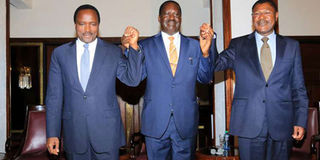Revive Mungatana bid for Cord chiefs to sit in Senate, not streets

Cord Principals Raila Odinga (centre), Kalonzo Musyoka (left) and Moses Wetang'ula hold hands in show of coalition unity at Laico Regency Hotel, Nairobi, on April 9, 2016. PHOTO | JEFF ANGOTE | NATION MEDIA GROUP
What you need to know:
- Raila Odinga received the support of just under half of voters in March 2013.
- John McCain went straight from the campaign trail in his unsuccessful run against Obama to the Senate.
- Ed Miliband and Gordon Brown are still MPs after losing elections in Britain.
- If Raila had been a member of the Upper House, it is possible that he would have found a way to manoeuvre to make his case for electoral reforms within the formal political institutions.
Danson Mungatana was right and everyone else was wrong. Twice in the space of about a year in mid June 2011 and in August 2012, he brought an amendment to Parliament on the nation’s electoral laws.
The premise on which he argued passionately on the floor of Parliament was this: It will be a mistake if a presidential candidate who goes around the country and gets the support of a huge proportion of voters is subsequently cast into the political wilderness for five years simply because they came second or third.
Mungatana had made the same case during the negotiations over the new constitution in Naivasha and failed to convince the various legal experts and the politicians present who could not foresee the pitfalls in the proposal to leave major presidential candidates in the cold.
His concerns are now playing out. Raila Odinga received the support of just under half of voters in March 2013.
But when Uhuru Kenyatta emerged as President, the leader of the Opposition, a man with a formidable support base and the backing of at least half of the nation’s old provinces, was left with absolutely no formal role to play in the nation’s official political institutions.
Kalonzo Musyoka, his running mate, was thrust into the same position as was Musalia Mudavadi, who also garnered a substantial number of votes.
The theoretical argument against allowing politicians to run for two offices at the same time was that you want to have only serious presidential candidates at the ballot and not people who are playing a game of chance.
But that is too puritanical an approach. In most advanced democracies, losing presidential candidates usually have something to fall back on.
John McCain went straight from the campaign trail in his unsuccessful run against Obama to the Senate, where he is a ranking member with many privileges.
Ed Miliband and Gordon Brown are still MPs after losing elections in Britain. The list goes on.
POLITICAL TALENT
Such an approach makes sense because serious presidential candidates will generally have a substantial support base and will also have some measure of political talent which can be used in productive ways in the legislature.
This is the case that Mungatana made and it bears repeating now. The Constitution should be amended to allow presidential candidates who pass a certain threshold of votes to be nominated to the Senate, for example.
If Raila had been a member of the Upper House after the 2013 elections, it is possible that he would have found a way to manoeuvre to make his case for electoral reforms within the formal political institutions. (How short-sighted were those who blocked him from running for the Homa Bay senatorial seat in hindsight?)
Even some of the less fanatical opposition supporters must know that the issue over the composition of the electoral commission has not got to the level where “people power” is the only remaining alternative.
The commissioners of the Independent Electoral and Boundaries Commission may have grounds for feeling that they are being subjected to a lynch mob but in their hearts of hearts, they must know that they will have to leave office because they cannot possibly preside over the next election with so many inflamed against them.
The question is the mechanics of their removal. Demonstrations where supporters meet with raw power displays by the police and some lose their lives are certainly not worth it.
But such “nuclear” options reflect the frustration that is a natural consequence of being completely exiled from formal political institutions as unsuccessful presidential candidates are under the Constitution.
That should be changed. In West Africa, a culture of consensus across ethnic and political lines in the best African traditions has been cultivated by such institutions as the Council of State, a gathering of prominent and eminent statesmen and women who counsel the head of state.
These individuals, including former heads of state and CJs and representatives of various regions, do not exercise formal power and so cannot come in the way of the implementation of the President’s agenda, but they play a critical role in mediating in times of conflict and bridging differences between various players at key times.
If such an organ existed in Kenya, and certainly if the likes of Raila and Kalonzo and Mudavadi were given a soft landing in the Senate or other places, the country would not be in the position it is in now when people are waging war on social media and in the streets over an issue which is little more than a tempest in a tiny tea cup.
[email protected] @mutigam





